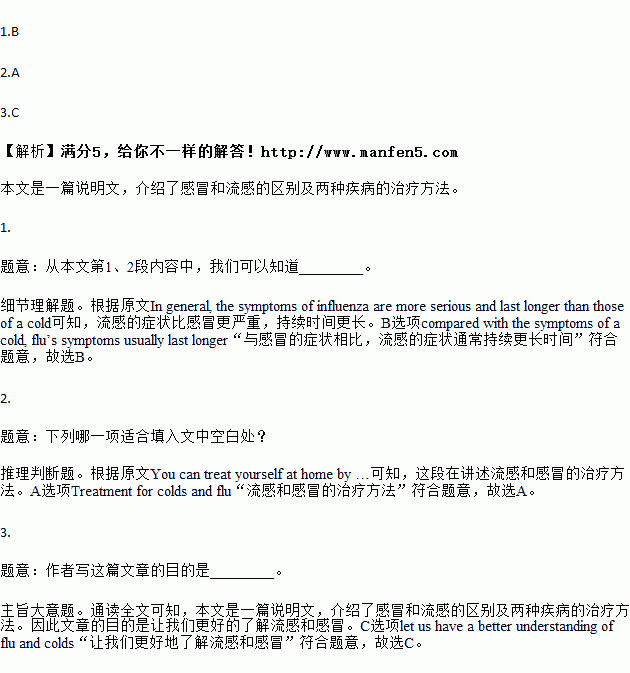题目内容
Differences between colds and flu
Both colds and influenza(flu)(流感) are caused by viruses and the two illnesses can have similar symptoms(症状). At first it can be difficult to tell the difference. In general, the symptoms of influenza are more serious and last longer than those of a cold.
The main difference between cold and flu symptoms is that flu more commonly includes fever: the fever can be 38℃ or higher and last for 3-5 days. The great tiredness caused by flu can last for weeks while cold symptoms are generally not serious and last for about 1 week. Also, runny nose is more common with cold than flu. Vomiting(呕吐) is another key difference: vomiting is not usually connected with the common cold but can be found in flu.
Although the differences above are generally true, it is impossible to know for sure if it is flu or cold. For example, it is possible to have flu without fever.
①
Antibiotics(抗生素) don’t work against a cold or flu because they attack bacteria(细菌) instead of rinses, You can treat yourself at home by
?getting plenty of rest and sleep (this means staying home from work or school)
?drinking plenty of fluids (especially water)
?and if you have a sore throat, eating soft foods that are easy to swallow.
See your doctor if you have cough and high fever (38℃ or more) that is not improving, trouble breathing, chest pain, or if you have other worries about your symptoms.
1.From Paragraph 1 and Paragraph 2, we know that ________.
A.at first it can be easy to tell the difference between colds and flu
B.compared with the symptoms of a cold, flu’s symptoms usually last longer
C.fever is more common with cold than flu
D.vomiting cannot be found in a common cold
2.Which of the following is suitable for ① ?
A.Treatment for colds and flu
B.Difference between bacteria and viruses
C.Stopping the increase of colds and flu
D.Advantages of staying at home
3.The writer’s main purpose of writing the passage is to ________.
A.ask us to act to stop the spread of flu and colds
B.warn us of the danger of having flu and colds
C.let us have a better understanding of flu and colds
D.teach us how to stop flu and colds

